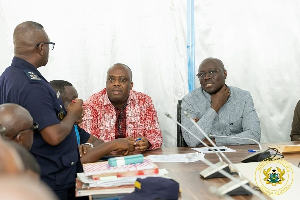By Kwame Okoampa-Ahoofe, Jr., Ph.D.
Mr. K. B. Asante, the retired diplomat and Nkrumaist politician, is not the first Ghanaian citizen to call for the extension of a presidential term from the current four-year regime to seven years (See “Extend Term of Presidency to Seven Years – K. B. Asante” Ghanaweb.com 2/21/12). Shortly before handing over the reins of governance, for instance, former President J. A. Kufuor had issued a similar call, suggestively. Back then, in 2007, or thereabouts, many of us avid watchers of the Ghanaian political scene felt annoyingly chary about the same, being that Mr. Kufuor had made his suggestion shortly after relishing a sumptuous banquet with then-Nigerian president and former strongman, Gen. Olusegun Obasanjo. The latter had begun showing clear signs of reluctance to democratically relinquish the reins of governance, as stipulated by his country’s august Constitution. He would cynically finesse his arch-lieutenant, Alhaji Abubakar Atiku, out of the race to succeed him.
The first problem with Mr. Asante’s call for the terminal – or tenure - review of the presidency is that it lacks regularity or symmetry and thus is very likely to put the country into a tizzy, thus my quite well-founded belief in the motive of such call being mischievously tinged. For instance, how do we, as an electorate, vote a presidential candidate into power for an initial term of seven years and then go back to the polls after the latter term has elapsed, in order to vote to retain the presidential incumbent for an additional measly term of three years? And what if that incumbent loses his/her reelection bid, as appears to be a clear possibility, based on present circumstances, for instance? Then what happens? Do we then do away with this seven-by-three regime, in order to allow the triumphant challenger for the presidency to govern for seven years, or, perhaps, even force him/her to rule for a piddling three-year term, since this was the pre-election plan or agenda, and then run for reelection, three years later, in order to make up for the preempted initial deficit of four years, in order to make up for the remainder of the initial seven years? And then run, once again, in order to make up for the constitutionally stipulated second three-year term? Does the reader get the drift of such electoral insanity?
In essence, it appears to me that in order to ensure electoral sanity, maybe a revised presidential term ought to be extended from the current four-year term to a half-decade or a five-year term. Then also arises the question of a parliamentary terminal review. Since our present Fourth-Republican Constitution holds parliamentarians to a four-year term, just like the presidency, would this automatically imply extending a parliamentary tenure to seven years, with the possibility of a term limit being imposed on parliamentarians, just like the presidency since, under the current constitutional regime, a party in power is mandated to appoint most of its cabinet members from our National Assembly? Then also, what happens at the levels of the district and regional assemblies?
The fact of the matter is that there is absolutely no forensic evidence, whatsoever, both on the African continent and elsewhere, indicating that countries with more than the standard four-year (or leap-year) presidential tenures are any better administered, or governed, than those adhering to the American-type of presidential tenure. The grim and incontrovertibly universal reality is that the longer any government stays in power, the more corrupt and arrogant its key operatives become. Besides, any leader who finds it extremely difficult to both lay out and implement a cohesive development agenda within twelve months of the assumption of the reins of governance, must have erroneously envisaged his job, going in, as one that is the functional equivalent of a sabbatical leave or an extended vacation.
But even on latter score, those of us who have had the quite intellectually and spiritually stimulating and refreshing privilege of being awarded a sabbatical leave from our hectic, year-round academic schedules, would be quick to point out that a productive sabbatical leave is rarely any less hectic than our regular, or workaday, academic schedules. In other words, any presidential aspirant who finds the current four-year presidential term to be woefully inadequate must definitely have opted for the wrong profession. And if any well-meaning Ghanaian citizen were to ask me what the most pressing problem is on our national political landscape, presently, my prompt and unreserved response would tersely be as follows: The present crop of Ghanaian leadership, particularly on the pseudo-social democratic side of the parliamentary aisle, woefully lacks the sacrificial zeal of dedicated neo-pioneers like Dr. Danquah and the other seminal leaders of the erstwhile United Gold Coast Convention (UGCC). Alas, once that common, united front was cynically and deviously breached by that pseudo-socialist off-sider from hell, the primal curse of Ali Baba and his forty thieves descended upon our pates! This, of course, is the tragic story of the fall of the House of Danquah.
Adwuampong Akonwakese Nana ‘Koampa-Agyeman, I say: to heck with all those looking to Woyome-Gorgormized our providentially sanctioned constitutional Republic of Ghana! Hallelujah, Seremu ’Sei!
*Kwame Okoampa-Ahoofe, Jr., Ph.D., is Associate Professor of English, Journalism and Creative Writing at Nassau Community College of the State University of New York, Garden City. He is Director of The Sintim-Aboagye Center for Politics and Culture and author of “Dr. J. B. Danquah: Architect of Modern Ghana” (iUniverse.com, 2005). E-mail: okoampaahoofe@optimum.net. ###
Opinions of Thursday, 23 February 2012
Columnist: Okoampa-Ahoofe, Kwame














